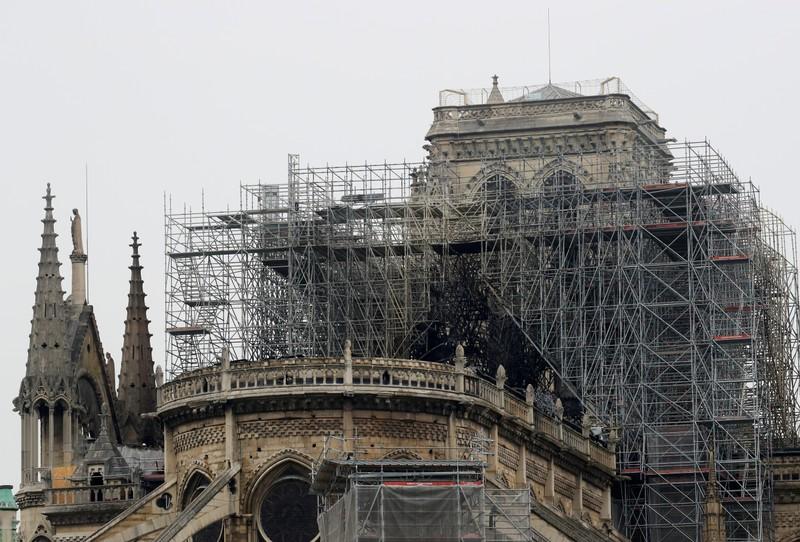PARIS, (Reuters) – The fire that tore through Notre-Dame cathedral was probably caused by accident, French prosecutors said on Tuesday after firefighters doused the last flames in the ruins overnight.
More than 400 firemen were needed to tame the inferno that consumed the roof and collapsed the spire of the eight-centuries-old cathedral. They worked through the night to bring the fire under control some 14 hours after it began.
“We are favouring the theory of an accident,” Paris public prosecutor Remy Heitz said, adding that 50 people were working on what was expected to be a long and complex investigation.
One firefighters was injured; no one else was reported hurt in the blaze which began after the building was closed to the public for the evening.
From the outside, the imposing bell towers and outer walls, with their vast flying buttresses, still stood firm, but the insides and the upper structure were eviscerated by the blaze.

Investigators will not be able to enter the cathedral’s blackened nave until experts are satisfied its stone walls withstood the heat and the building is structurally sound. Television images showed firefighters atop the towers.
“The fire is fully extinguished,” fire service spokesman Gabriel Plus told reporters. “Our job today is to monitor the structure and its movements.”
The fire swiftly ripped through the cathedral’s timbered roof supports, where workmen had been carrying out extensive renovations to collapsed balustrades and crumbling gargoyles, as well as the spire’s wooden frame.
The Paris prosecutor has opened an investigation into “involuntary destruction by fire”. Police on Tuesday began questioning the workers involved in the restoration, the prosecutor’s office said.
Hundreds of stunned onlookers had lined the banks of the Seine river late into the night as the fire raged, reciting prayers and singing liturgical music in harmony as they stood in vigil.
“It’s a symbol of our country that risked being destroyed,” Culture Minister Franck Riester said.
Firefighters who entered the burning building saved many of its treasures, Riester said, although some paintings remained inside and risked smoke and water damage.
MULTI-MILLION DOLLAR DONATIONS
President Emmanuel Macron promised France would rebuild Notre-Dame, considered among the finest examples of French and European Gothic architecture and visited by more than 13 million people annually.
Notre-Dame is owned by the state and has been at the centre of a years-long row between the nation and the Paris archdiocese over who should bear the brunt of costs for badly needed restoration work.
It was too early to estimate the cost of the damage, said Bertrand de Feydeau of the Fondation du Patrimoine, a charity which works to protect French heritage, but it is likely to run into the hundreds of millions of dollars.
Two of France’s wealthiest men, Francois-Henri Pinault, chief executive of the Kering group which owns brands including Gucci and Yves Saint Laurent, and Bernard Arnault, the main shareholder of luxury group LVMH, said they would donate 100 million euros ($113 million) and 200 million euros respectively. The city of Paris pledged 50 million euros.
Other campaigns were launched in the United States as well-wishers around the world pledged contributions via social media.
Paolo Violini, a restoration specialist for Vatican museums, said the pace at which the fire spread through the cathedral had been stunning.
“We are used to thinking about them as eternal simply because they have been there for centuries, or a thousand years, but the reality is they are very fragile,” Violini said.
A centuries-old crown of thorns made from reeds and gold, and the tunic believed to have been worn by Saint Louis, a 13th century king of France, were saved, Notre-Dame’s top administrative cleric, Monsignor Patrick Chauvet, said.
Copper statues representing the Twelve Apostles and four evangelists were removed by crane last week as part of the restoration work.
American tourist Susan Hargrove said she’d been left breathless by the scale of devastation.
“We are talking of world history, of our Western culture but also of something that is truly universal,” Hargrove said. “Notre-Dame means something to everybody.”
